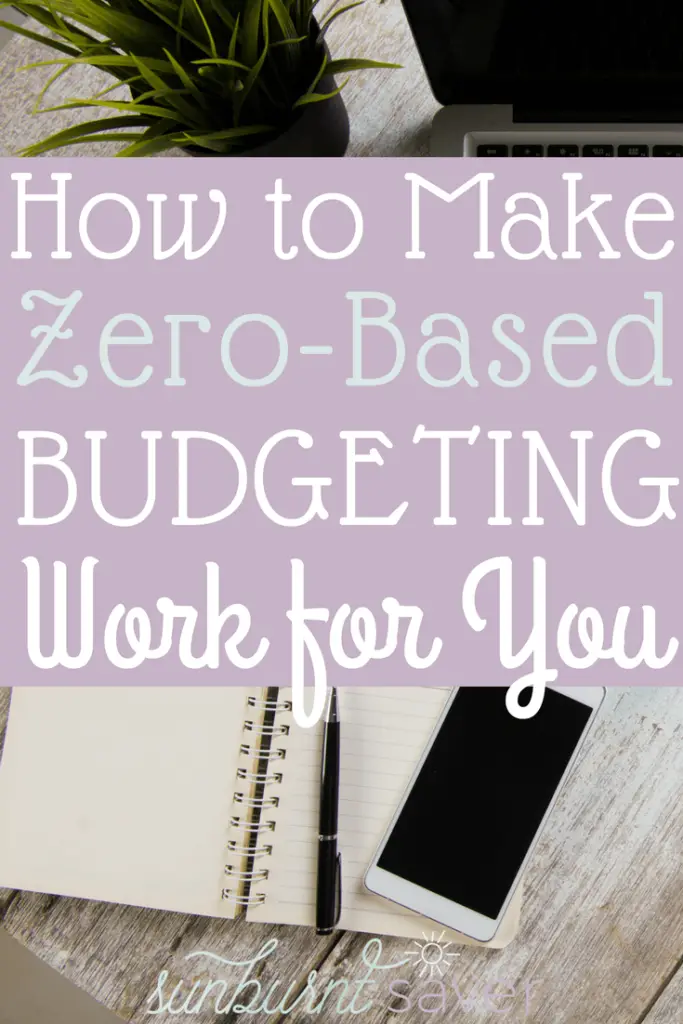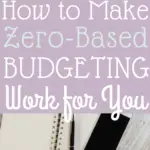This post may contain affiliate links, which means if you click through and purchase something using my links, I receive a small commission. You can click here to read my disclosure policy ? Thank you!
Is it really wrong to live paycheck to paycheck? This is a crazy question, isn’t it? Of course living paycheck to paycheck is a bad idea! When people say “I live paycheck to paycheck”, most people immediately flash to someone who has no savings, no retirement, and no emergency fund. In the worst cases, we might even think of someone who spends frivolously with no care about her future.
But that’s not necessarily the case. Living “paycheck to paycheck” can also be categorized as “zero-based budgeting” – every expense is allocated for and every dollar that comes in is tracked.
Does that sound complicated? It’s really not! Many people already do this intuitively, and it also piggybacks off the concept of “envelope based budgeting”, which is putting your money in envelopes (like $100 for groceries) and only spending what’s in that envelope – nothing more.
For those of us who struggle to save and pay off debt, living a paycheck to paycheck (or zero-based budgeting) lifestyle can be really helpful. For me, I know exactly where my money is going every month. By having a zero-based budget, I don’t have to make choices with my money – meaning I don’t give myself as many options to mess up 🙂
Here’s how living paycheck to paycheck/zero-based budgeting works – and why it works for many of us who struggle to save and pay off debt!

How Zero-Based Budgeting Works
A zero-based budget takes away the stress of making money decisions every month. How? Because your dollars already have a job the minute you get paid – no dollar is left hanging around for you to spend on stuff you don’t really want or need.
Basically, your goal is to allocate your income until you have $0 left. Here’s how this could look:
I bring home $3,000 a month. Using a zero-based budget, I spent $1,000 on my mortgage, $400 on groceries, $300 on utilities, and $400 on student loan debt. Car insurance and gas is another $100 a month, and $50 for the cellphone bill. That leaves $750 so far for everything else. Personal grooming and household supplies costs another $100 a month, pet food another $50 a month. Since I want to build up an emergency fund, I put $300 into emergency savings.
This leaves $300 for anything else. I can give myself a “fun budget” of $50 a month to be used on anything, no questions asked. Also, I want to take a vacation next year, so I’ll allocate another $50 toward my vacation budget. With the remaining $200, I can either put more toward my student loan debt or I can put it into retirement savings.
In this scenario, the only choices you have to make are how much of a “fun budget” you want, and whether or not your “extra” month should go to debt repayment or retirement savings. Once you’ve answered these questions, you have $0 left and you’re ready for the next paycheck.
Why Zero-Based Budgeting Works
I bet you live a zero-based budget, or something close to it, and don’t even realize it. After all, this is a lot like a budget for fixed expenses and variable expenses. You have to pay for some things, like your rent/mortgage and groceries, or else you’d be homeless and hungry.
But the benefit of living a zero-based budgeting lifestyle is lack of choices. Yes, I know that sounds hard and terrible. Who wants to live without choices? People in debt, that’s who.
I know this blog is about living your best life while paying off debt and saving for retirement! It’s my mission! But hear me out: living a strict zero-based budget is actually freeing.
By only having one choice to make with my “extra money” every month, I’m reducing the chances of getting frustrated with budgeting. Making fewer hard choices every month makes scientific sense, too.
Studies show willpower decreases throughout the day, which makes a lot of sense. All morning you might eat healthy, and save your money instead of spending it on another coffee. By the end of the day, you’ve made so many choices, your brain just says “forget it” and you pig out on spaghetti and meatballs, wine, and chocolate, blowing your calorie budget for the day. Or you go out to the movies and spend $50 in one night just on food and the ticket.
If you live “paycheck to paycheck”, your allotment for “fun” money is just $50 (if that’s what you choose). That’s it. Your only hard choices for the month are how and where you’re going to spend that $50 “fun money” – not should you spend $300 in “fun money” and figure out how you’ll save later. Your savings is already taken care of with zero-based budgeting.
Living Paycheck to Paycheck is Easier
When you think of living paycheck to paycheck as “zero-based budgeting”, meaning you allocate all of the money coming in to something every month, living paycheck to paycheck becomes easier.
True living “paycheck to paycheck” sucks – it’s the type of life we think of when we hear “paycheck to paycheck”. It’s the constant stress of not having enough savings to cover an emergency, or not enough coming in to pay your bills and take of your family. If you’re truly living paycheck to paycheck, all of your money goes to life instead of security, like savings and debt repayment.
However, for those of us who do have a little extra coming in, living paycheck to paycheck isn’t a bad thing. What if you lived paycheck to paycheck because you wanted to, not because you had to? What if every dime went to something that means something to you instead of being frittered away on things you don’t really need?
I’m the last person in the world to say give up everything you love and pay down debt. Personally, I think that’s ridiculous. I’m not all like “YOLO”, but the fact is no one knows when they’re going to go. If spending time with family or taking amazing trips makes life worth living, then budget for it. If it takes another year to pay off debt, I’m willing to make that sacrifice to spend time with loved ones while they’re alive and take trips while I am healthy.
Zero-based budgeting helps me save for retirement, pay off debt, and save for meaningful trips automatically. My income fluctuates monthly, so I’ll have to recalculate, but my choices are limited and I know every category gets something in it. This means I’m always saving for retirement, paying off debt, and putting money toward a fun trip once a year.
Have you thought of living a paycheck to paycheck life or trying zero-based budgeting? How do you set up your budget? If you’re looking for a free budget tracker, check out this post for a free budget printable!



I love a good zero-based budget!
And by good, I mean what you have – making sure you’re allocating money towards the future not just towards today’s needs.
After my motorcycle accident, I got back on my financial feet by tracking my debts in an old fashioned ledger until they were paid off. Nowadays, I do it all electronically, but I still track all my money coming in, and going out. Especially now that I’m temporarily retired (read “laid off”)!
As long as your paycheck to paycheck life prepares you for eventual retirement, it’s all good…